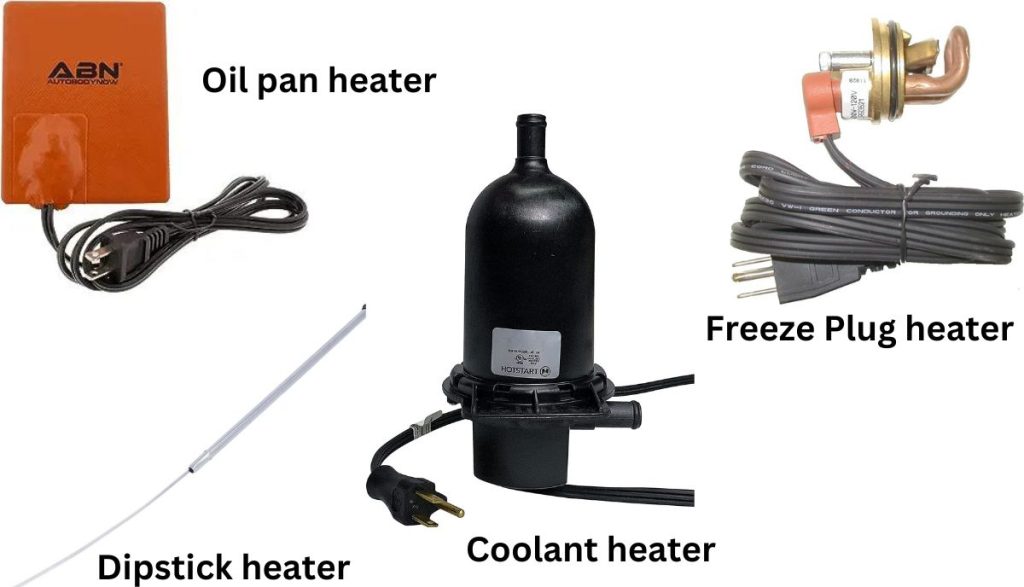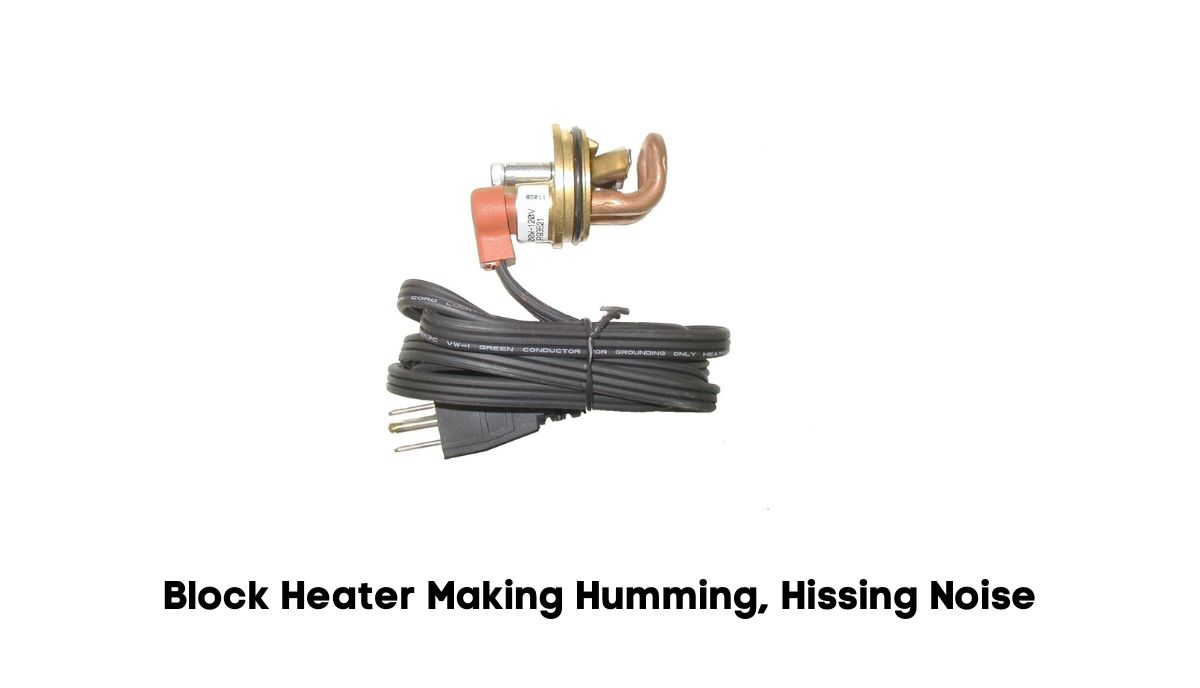Block heaters warm the engine on cold days. But do they perform this function quietly?
Block heaters come in various types. Some are silent. Others are loud. Some generate sounds but are too low for you to notice unless you pay close attention.
You also have sophisticated block heaters that deliberately beep to alert users about a significant development. Check the manual for clarification. It will let you know what to expect. The manual matters because many consumers panic when they hear a block heater’s sounds. They expect the device to operate quietly.
Others are the opposite. They ignore troublesome noises that only occur when the heater malfunctions. The manual will provide guidance. Besides letting you know whether a heater should make noise, it will also differentiate between concerning and innocuous sounds.
What if you don’t have a manual? Check the manufacturer’s website for answers. You can also send their customer support personnel a message. Better yet, take the car to the dealership, especially when you notice sounds you don’t recognize.
Let them troubleshoot the heater and provide answers. A silent block heater should also worry you if the manual, mechanic, or dealership mentions operational sounds.
Identifying Specific Mechanical Components In Block Heaters That May Generate Noise
Block heaters are not all the same. Oil pan heaters attach to the oil pan to warm the engine oil. In-line coolant heaters are configured into the radiator coolant hose. Freeze-plug heaters replace the freeze plug in your engine. You also have dipstick heaters. They replace the traditional dipstick.

Which block heater type do you own? Many drivers cannot answer this question because their block heater came with the car. In that case, you may encounter one or more of the following parts:
- Housing – The housing keeps the electrical components contained. On its own, the housing is unlikely to make noise unless external elements within the heater’s vicinity knock against it.
- Heating Tubes – The heating tubes will convert electrical energy into heating energy to raise the coolant’s temperature. The change in temperature may generate some noise. Some people hear hissing. Others have recorded bubbling.
- Water Pump – Heaters with a water pump component have impellers that soak in the coolant. The water pump’s operations may produce a sound.
- Coil – The water pump coils don’t mix with the coolant. A mechanic may inspect them if they blame a block heater defect on an electrical or temperature issue.
- Rotor – The rotor consists of a stable magnet and a plastic cover. It works with alternating current and magnetic sheets to produce rotating power. A technician may inspect the rotor after observing strange sounds from the water pump.
- The thermostat manages the temperature. It prevents the heater from raising the temperature beyond a safe threshold. Thermostats are unlikely to produce the sounds you hear directly. However, they may indirectly contribute to the noise emanating from different parts, especially when they fail.
- Cable – The cable connects the heater to a wall outlet. Cables can fail because of the wear and tear caused by human traffic and extreme weather.
Types Of Noises That Can Be Associated With These Components
A technician is unlikely to blame a block heater’s noise on specific components. You have four notable exceptions:
- You may hear bubbling when the heating element comes into contact with the coolant. Some people compare this sound to a percolator’s noise.
- A damaged cable with exposed conductors is prone to arcing. This can lead to sparking and popping sounds.
- Hissing is not unheard of. You may hear the sound as the temperature in the icy sections of the engine block rises.
- Sizzling is similar to hissing, and you also hear it when a cold element’s temperature suddenly rises.
Differentiating Between Normal Operating Sounds Of Block Heaters And Unusual Or Problematic Noises
Many consumers ignore defective block heaters because they can’t differentiate between normal operating sounds and their problematic counterparts. What sets worrisome noises apart? Consider the following:
- No More Sounds
A silent block heater should worry you, especially if it typically makes noise while running. The silence shows that something has gone wrong.
- The Sounds Are Louder Than Usual
You should worry if you usually hear a faint humming, but it has become a loud buzzing. Look for signs of a fault. You don’t want the heater to fail when you need it the most.
- You Hear Crackling And Popping
Don’t ignore crackling and popping. They usually point to arcing. Arcing can lead to short circuits and fires. Inspect the heater and its cord before the worst comes to pass. Extension cords are notorious for starting fires because of arcing.
- The Sound Is Loud Enough To Vibrate The Grill
Loud vibrating sounds become a problem when they get so strong that the grill starts shaking. The humming is typically faint.
- The Vehicle Struggles To Start
You can ignore loud sounds or silence if the block heater works as expected, especially if you’ve failed to identify noteworthy faults after inspecting the heater. However, you should take note of any noise you hear after a heater stops working.
You can tell that a heater doesn’t work because the car will struggle to start on freezing days. It may refuse to start altogether.
The Typical Sounds That Can Be Expected During Block Heater Operation
You can identify a working block heater by the sound it makes when you push the plug into a wall outlet. But which sounds do you typically hear in a healthy block heater? Look out for the following:
- Many consumers report hearing a noise like boiling water under the hood.
- Humming is another common sound. It isn’t loud enough for you to hear unless you come close.
- Some people hear buzzing instead of humming. They call it an electrical sound.
- Listen for a faint hissing when the heater first starts.
- Gurgling isn’t as common in newer heaters, but don’t be surprised if you encounter this sound.
- Rattling is a little concerning. But it’s normal in some cases. You can blame the sound of a rattling air purge tab.
Factors Affecting Noise Levels Of Block Heaters
- Block heaters that make noise tend to get louder as they approach the end. Block heaters can easily last fifteen or more years. But eventually, they will fail. Their parts generate more noise because they’ve succumbed to wear and tear.
- Age matters. Newer block heaters are quieter because of their sophistication. Manufacturers know that many consumers hate sizzling, humming, and rattling.
- The model is even more important than the age. Some models are designed to be as loud as possible to show paranoid consumers they are working. Others are the opposite.
- The temperature makes a difference. You’re more likely to hear a noise when the coolant or heating element shifts from a low temperature to a high temperature.
Troubleshooting Tips For Minimizing Or Resolving Block Heater Noise Issues
- If the manual mentions the noise, you should leave the heater alone. Don’t tamper with it in an effort to reduce the cacophony. If you’re determined to alter the device, take the car to the dealership. While any experienced mechanic can help you, the manufacturer will void your warranty if an external party modifies their block heater.
- If the dealership cannot alter the block heater to reduce the noise, ask them to remove it. This option only makes sense if freezing temperatures lower than -15 C are rare in your region. Otherwise, you can damage the engine by starting the car in cold weather.
- If you think the heater has stopped working, check its current draw. Look at the electric meter after activating the block heater. The meter should move in response to the heater’s operations. If the meter is static, the heater has stopped working.
- If the results from the meter are inconclusive for some reason, measure the resistance across the plug’s flat prongs.
- Search for loose connections. Clean and tighten every connection before proceeding.
- Check the power cord. Is it loose in the wall socket? Is the jacket damaged? Are the conductors exposed? Do you need a new power cord?
- What about the GFCI? This assumes that you have one. Does it trip whenever you turn the heater on? Have you inspected it for moisture, debris, and loose connections? Have you tried replacing it?
- Some elements have a ceramic coating that cracks, allowing water to enter. Dirty water allows significant volumes of current to flow out of the crack, producing a noticeable humming. Replacing the element or the heater will solve the problem.
- If all else fails, get a new block heater. If the type you have is louder than you would like, ask the dealership to recommend a quieter option.

